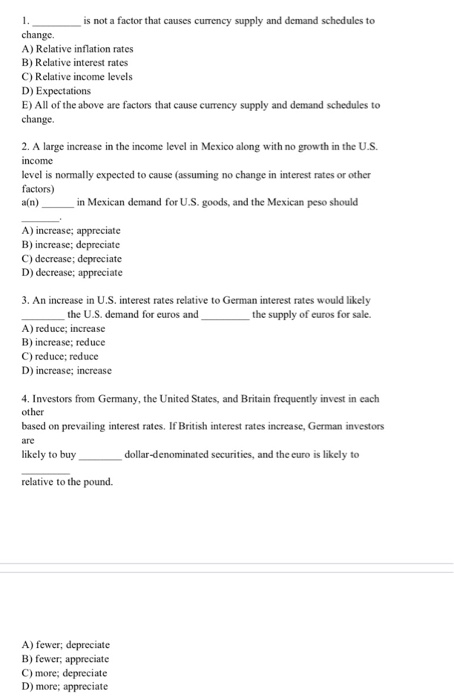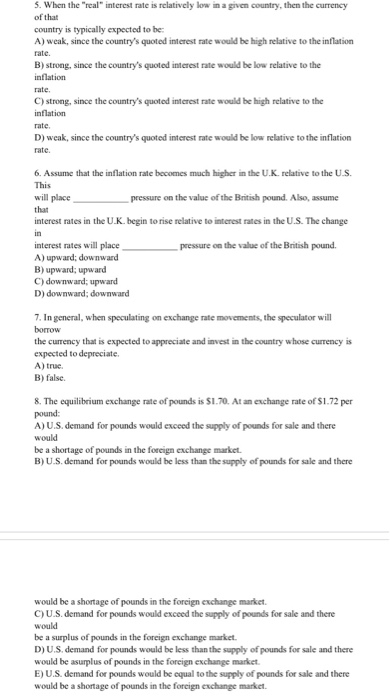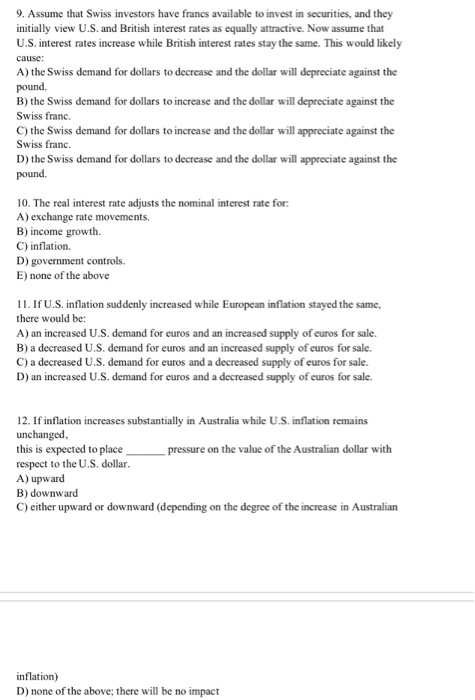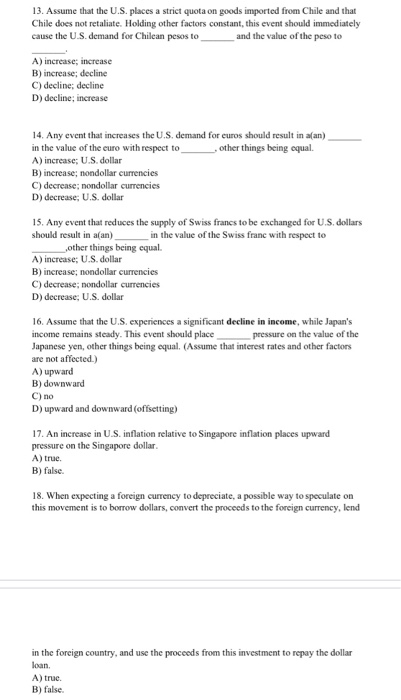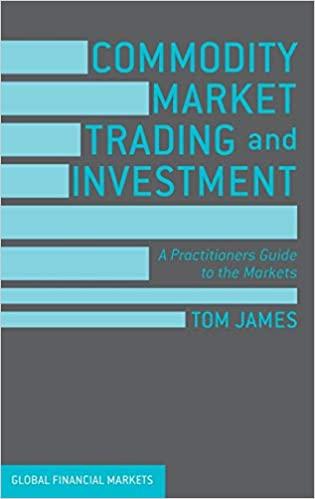1. is not a factor that causes currency supply and demand schedules to change. A) Relative inflation rates B) Relative interest rates C) Relative income levels D) Expectations E) All of the above are factors that cause currency supply and demand schedules to change. 2. A large increase in the income level in Mexico along with no growth in the U.S. income level is normally expected to cause (assuming no change in interest rates or other factors) an) _in Mexican demand for U.S. goods, and the Mexican peso should A) increase; appreciate B) increase; depreciate C) decrease; depreciate D) decrease; appreciate 3. An increase in U.S. interest rates relative to German interest rates would likely the U.S. demand for euros and the supply of euros for sale. A) reduce; increase B) increase; reduce C) reduce; reduce D) increase; increase 4. Investors from Germany, the United States, and Britain frequently invest in each other based on prevailing interest rates. If British interest rates increase, German investors likely to buy dollar-denominated securities, and the curo is likely to relative to the pound. are A) fewer; depreciate B) fewer, appreciate C) more; depreciate D) more; appreciate 5. When the "real" interest rate is relatively low in a given country, then the currency of that country is typically expected to be: A) weak, since the country's quoted interest rate would be high relative to the inflation rate B) strong, since the country's quoted interest rate would be low relative to the inflation rate. C) strong, since the country's quoted interest rate would be high relative to the inflation rate D) weak, since the country's quoted interest rate would be low relative to the inflation rate. 6. Assume that the inflation rate becomes much higher in the U.K. relative to the U.S. This will place pressure on the value of the British pound. Also, assume that interest rates in the U.K. begin to rise relative to interest rates in the U.S. The change interest rates will place pressure on the value of the British pound. A) upward: downward B) upward; upward C) downward; upward D) downward; downward 7. In general, when speculating on exchange rate movements, the speculator will the currency that is expected to appreciate and invest in the country whose currency is expected to depreciate A) true B) false. 8. The equilibrium exchange rate of pounds is S1.70. At an exchange rate of $1.72 per pound: A) U.S. demand for pounds would exceed the supply of pounds for sale and there would be a shortage of pounds in the foreign exchange market. B) U.S.demand for pounds would be less than the supply of pounds for sale and there borrow would be a shortage of pounds in the foreign exchange market. C) U.S. demand for pounds would exceed the supply of pounds for sale and there would be a surplus of pounds in the foreign exchange market. D) U.S. demand for pounds would be less than the supply of pounds for sale and there would be asurplus of pounds in the foreign exchange market. E) U.S. demand for pounds would be equal to the supply of pounds for sale and there would be a shortage of pounds in the foreign exchange market. cause: 9. Assume that Swiss investors have francs available to invest in securities, and they initially view U.S. and British interest rates as equally attractive. Now assume that U.S. interest rates increase while British interest rates stay the same. This would likely A) the Swiss demand for dollars to decrease and the dollar will depreciate against the pound. B) the Swiss demand for dollars to increase and the dollar will depreciate against the Swiss franc C) the Swiss demand for dollars to increase and the dollar will appreciate against the Swiss franc. D) the Swiss demand for dollars to decrease and the dollar will appreciate against the pound. 10. The real interest rate adjusts the nominal interest rate for: A) exchange rate movements. B) income growth C) inflation D) government controls. E) none of the above 11. If U.S. inflation suddenly increased while European inflation stayed the same, there would be: A) an increased U.S. demand for euros and an increased supply of euros for sale. B) a decreased U.S. demand for euros and an increased supply of euros for sale. C) a decreased U.S. demand for euros and a decreased supply of euros for sale. D) an increased U.S. demand for euros and a decreased supply of euros for sale. 12. If inflation increases substantially in Australia while U.S. inflation remains unchanged, this is expected to place pressure on the value of the Australian dollar with respect to the U.S. dollar. A) upward B) downward C) either upward or downward (depending on the degree of the increase in Australian inflation) D) none of the above; there will be no impact 13. Assume that the U.S. places a strict quota on goods imported from Chile and that Chile does not retaliate. Holding other factors constant, this event should immediately cause the U.S. demand for Chilean pesos to and the value of the peso to A) increase increase B) increase; decline C) decline; decline D) decline, increase 14. Any event that increases the U.S. demand for euros should result in afan) in the value of the curo with respect to other things being equal A) increase; U.S. dollar B) increase; nondollar currencies C) decrease; nondollar currencies D) decrease; U.S. dollar 15. Any event that reduces the supply of Swiss francs to be exchanged for U.S. dollars should result in aran) in the value of the Swiss franc with respect to other things being equal. A) increase; U.S. dollar B) increase; nondollar currencies C) decrease; nondollar currencies D) decrease; U.S. dollar 16. Assume that the U.S. experiences a significant decline in income, while Japan's income remains steady. This event should place pressure on the value of the Japanese yen, other things being equal. (Assume that interest rates and other factors are not affected.) A) upward B) downward C) no D) upward and downward (offsetting) 17. An increase in U.S. inflation relative to Singapore inflation places upward pressure on the Singapore dollar A) true. B) false. 18. When expecting a foreign currency to depreciate, a possible way to speculate on this movement is to borrow dollars, convert the proceeds to the foreign currency, lend in the foreign country, and use the proceeds from this investment to repay the dollar loan A) true. B) false
